The Worst Marketing and SEO Scams to Spot and Avoid

Unfortunately, the world around us is full of scams. From the email and text spam we all get every day, to sophisticated spear phishing and con artistry, to financial scams and fraudulent businesses, it's a dangerous world to navigate.
Sadly, marketing and SEO are no different. In fact, the marketing world is full of scams because of the fertile ground caused by the intersection of three truths:
- Marketing is vastly complex, with a million details to know and understand.
- Marketing has a reputation as a high-stakes, high-stress job.
- Marketing is rapidly changing, but there's a ton of old information still available.
This is ripe ground for scams and fraud. You see everything from ad managers who just automate a system you could do yourself and charge you for it to SEO "professionals" who convince you that outdated, low-effort techniques are valuable and charge you for services that don't work (or worse, get your site penalized or deindexed). There are even agencies that provide perfectly fine services for 100x the price you would ever really need to pay for them.
Before digging in too deep, one thing to know is that I'm leaving off some of the outright crimes that are common everywhere online these days. Obviously, if a site is claiming to be Ahrefs and asking you to log into Aahrefs.com to steal your authentication information, that's a scam and a crime, but it's not really unique to marketing... I'm trying to stick to the more sophisticated and marketing-specific scams to watch for.
Since it's such a tricky situation to navigate, I've put together this list of the most common scams, how to spot them to avoid them, and some tips on how to find better marketing agencies.
Guaranteed #1 Rankings
First up, we have one of the most common scams, which is really just a boast. Any SEO company that promises that they can get you to rank #1 in Google search results is lying. There are no two ways about it.
The variance comes down to what they're promising and what lengths they go to if they want to try to prove it.

A few examples:
- Companies that show their own ranking to "prove" they can do it are probably doing branded searches for themselves to show their place at the top.
- Companies that show organic search results with no visible query are probably using very niche keywords that you can rank for, but have no competition (and no traffic.)
- Companies that show you ranking #1 for highly competitive keywords could be paying for PPC ads and editing out the Sponsored tag or just manipulating screenshots entirely.
Google doesn't even know what pages will rank #1 for any given query or whether or not those rankings will change. They're also not universally consistent, and different people searching the same query can see slightly different tailored results.
Don't buy into the hype with promises that can't be kept.
Unsolicited Guest Posts for Links
Anyone who runs a website is surely familiar with this if they check their email at all. There are legions of "marketers" out there who send out emails offering free content.
Usually, they talk about how they have a site with high-ranking content that has a good Domain Authority or that ranks well for whatever keywords. They'll offer to throw their name in the ring as an added bonus for your site, writing content you can publish for free. All you need to do is publish it as-is, with a link to their site in it.
The "scam" here is just that: 99% of the time, the person behind the email has no real name recognition or reputation, their site has no real value to you or in general, and they're just hoping to get a link from a legitimate domain to perk up their own SEO. In some cases, this is part of a private blog network.
In other cases, it's just poor outreach.

Now, it's entirely possible that real, legitimate bloggers and sites are doing the same sort of cold email outreach. The difference is that you can generally find those people on social media and on their sites, you can evaluate their claims, and you can judge their content.
More importantly, they'll be willing to work with you rather than just demanding a link. Guest posting can be a legitimate technique, and email outreach is fine, but it's a tough sell with the scammers on all sides...
Unsolicited SEO Audit Results
Another common email we webmasters often receive is some scary report about how Google is auditing and about to drop us, or that a PageSpeed or Lighthouse or Web Vitals or just general SEO Audit has been performed and our site is riddled with errors.
SEO audits are fine. Lighthouse and web vitals and all the rest are real tools. They also don't email you proactively; they're tools you have to use.
If someone is sending you a scary report in your inbox about it, it's because they want you to pay them to fix whatever issues they perceive.
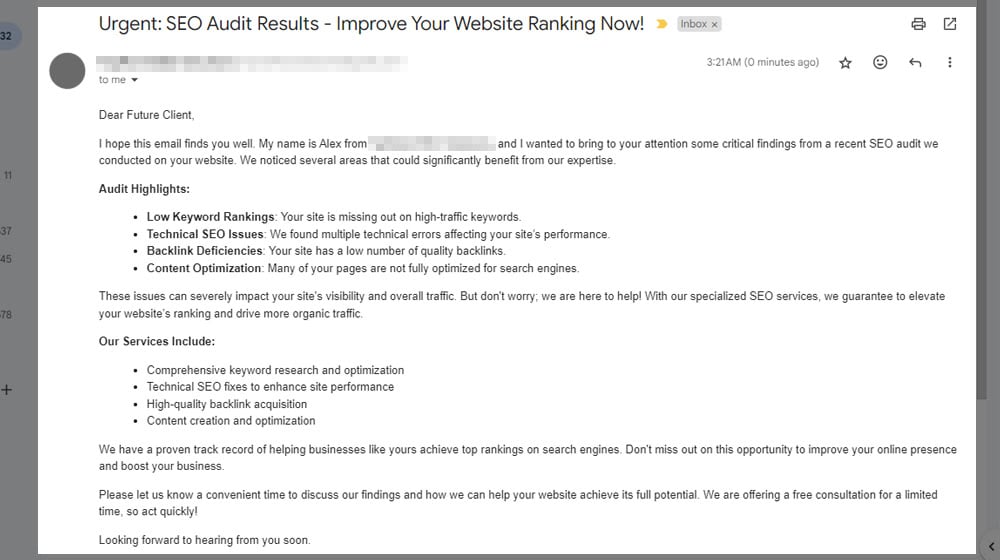
To tell you how ridiculous this is, I've had these emails show up complaining about issues with something I've already fixed, known I've fixed, and have verified via my own tests.
It's entirely possible that your site may have web vitals issues or general SEO problems that an audit will catch. But, any company or individual sending you a report is just hoping you'll pay them, often to do little or no real work.
Long-Term Contracts Required
This one isn't necessarily a scam, but so often, it might as well be.
Long contracts, especially without an exit clause, are incredibly exploitative. They often tend to come alongside a company that does sub-par work, is difficult to contact, frequently drops phone calls, and doesn't pick up if you ever make noise about canceling. They may also try to have a cancellation fee, though those have to be handled properly, or they may not be legal.
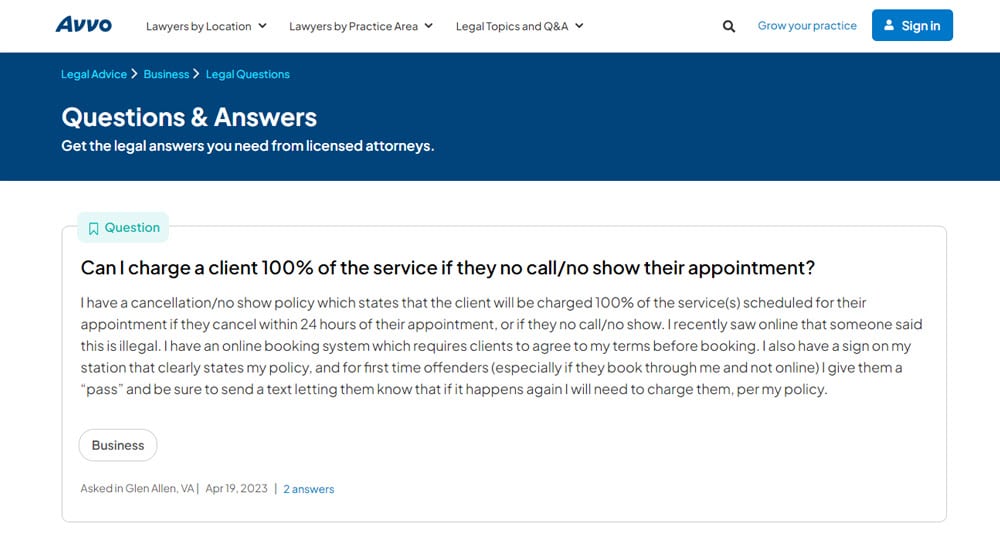
Personally, I hate contracts, which is why I take things month to month or even week to week, working closely with my clients.
The best guarantee of keeping a client around is providing great service, not trying to lock them in to a marraige that they don't want to be in with scary legalese and threats of lawsuits. Which one sounds better?
Link Building Packages
Link building is one of the most difficult things to do in marketing.
That's because it's almost entirely reliant on forming actual relationships and partnerships with other businesses and on producing such high-quality content (and sharing it around) that it earns links organically.
I like quoting this a lot throughout my site; it was a quote by Matt Cutts back in the day:
"The objective is not to make your links appear natural, the objective is that your links are natural." - Matt Cutts.
Any strategy where you can build the links yourself is going to be penalized or zeroed out by Google, and any strategy that isn't caught can get you penalized when it's later discovered, like PBN usage.
Link building is also one of those areas where there are thousands of articles about it, and many of them are old enough to still contain information about techniques that are no longer valid, so it's hard to tell what's legitimate and what isn't if you aren't already experienced.

Truthfully, most package-based link-building services are either just PBNs selling links that will evaporate in weeks or months or are companies using their clients to link to each other in an unwitting link scheme that will eventually get all of them penalized by Google.
It's just something you need to steer clear of entirely to be safe. Unless you're 100% sure it's a manual approach, like our link earning service.
Link Bait and Switch
A related issue is the link bait and switch scam. Whether you're trying to perform link outreach or someone messages you about it out of the blue, the general idea is that a site you want to earn a link from has a link to a competitor already. Rather than link to you as well, they offer to change the competition's link… for a fee.
Once you pay the fee, the link might change, or it might not. Sometimes, the person claiming they will change the link isn't even affiliated with the site in question. Sometimes, they have no intention of changing the link. Sometimes, they message the competitor and offer to have it changed back, also for a fee.

Whatever the case may be, any time money is exchanged for links in any form, it's against Google's policies and can get the link and the domains on either side of it penalized.
Pay-for-Performance SEO Services
Most of these are SEO companies that are very nebulous with the services they actually offer, or they have extremely comprehensive pages that make it look like they do everything. What they actually do is very little, but they watch your analytics like a hawk, and they know exactly how to zoom in on even the smallest of changes and take credit for it. Oh, it's the peak season, and your traffic went up 35%?
Clearly, we did that for you.
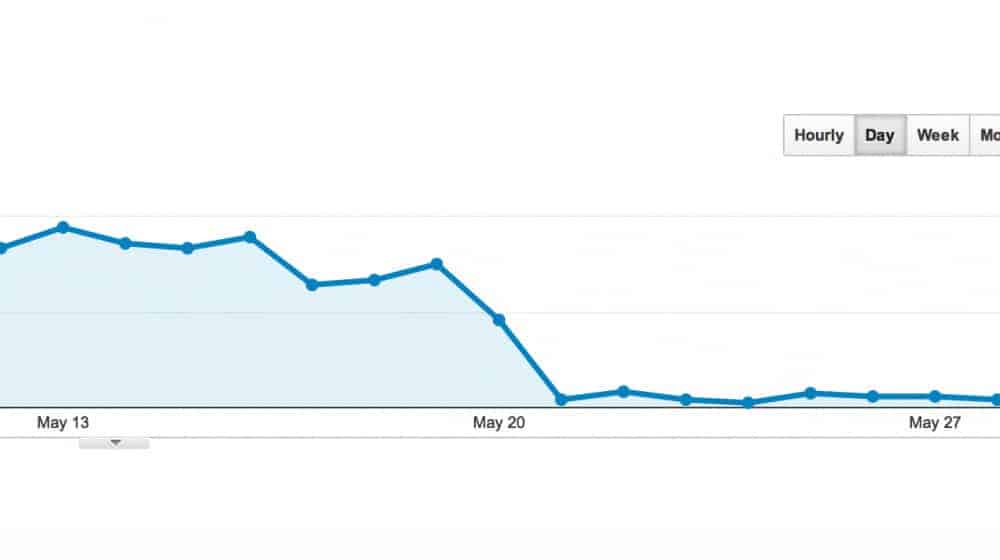
The biggest issue is that these companies charge you a retainer fee and then charge you extra for the performance you get from "their services" when it was probably nothing they did in the first place.
These companies also frequently have long contracts and bundle other scams as well.
Poor Quality Content Services
This is one of my biggest peeves and an unfortunately growing scam. They'll be services a lot like mine, offering blogging and content creation. Then, they give you posts that are just garbage. They're thin, they're boring, and they have no substance to them. In many cases, they're outright spun or even just stolen content.

This scam is getting worse as generative AI gets better because it's way, way easier to make passable-looking content for free in minutes. It's critical to keep a very close eye on the content you buy and only enlist services from reputable agencies (like us)!
Marketing Bundles and Site Takeovers
This one is one I've had to deal with for a couple of my clients, and it's always a mess.
Essentially, the marketing company really wants to go with one particular ecosystem, whether it's WordPress, Wix, Squarespace, or something of their own design. They insist on migrating a site as part of their marketing, usually with promises about performance on their servers or something. So, in addition to marketing, you're signing a contract for hosting, domain registration, and more, all from the same provider.
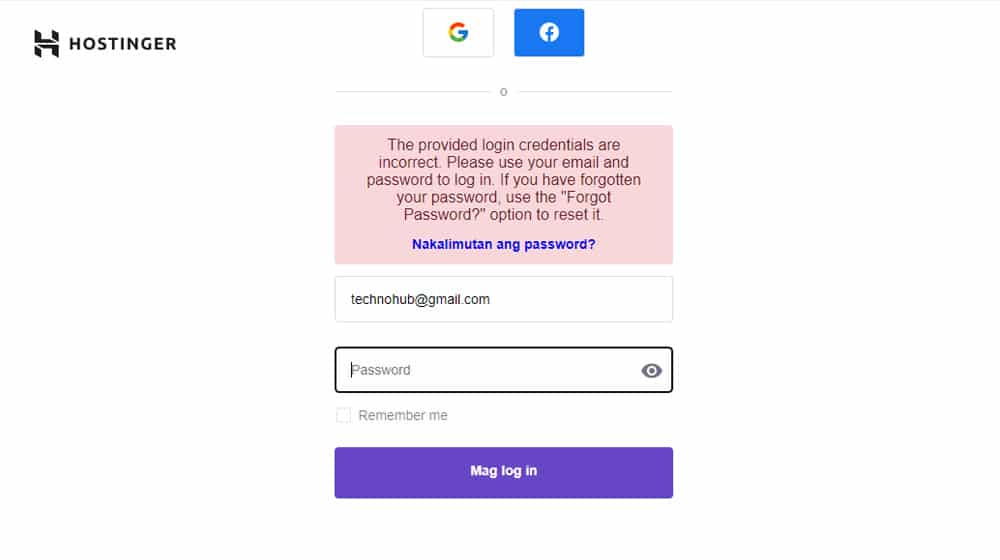
This alone isn't necessarily terrible, but what happens is, if you ever try to cancel, suddenly they pull out the contract and point to how the migration transferred ownership of the assets to them, so you don't even own your own site anymore.
Want to leave? Good luck starting over! Needless to say, it's a massive pain, and you end up having to rebuild your entire site from scratch.
Directory Submission
Directory submission is an older form of link building and marketing, and some people still believe in it.
Directories can be relevant if they are very, very specialized (like local business directories) or are for non-general content (like podcasts or infographics), but for general website submission, they're pretty much worthless.
Search Engine Submission
Sometimes, you'll come across a marketing service that promises submission to hundreds of search engines.
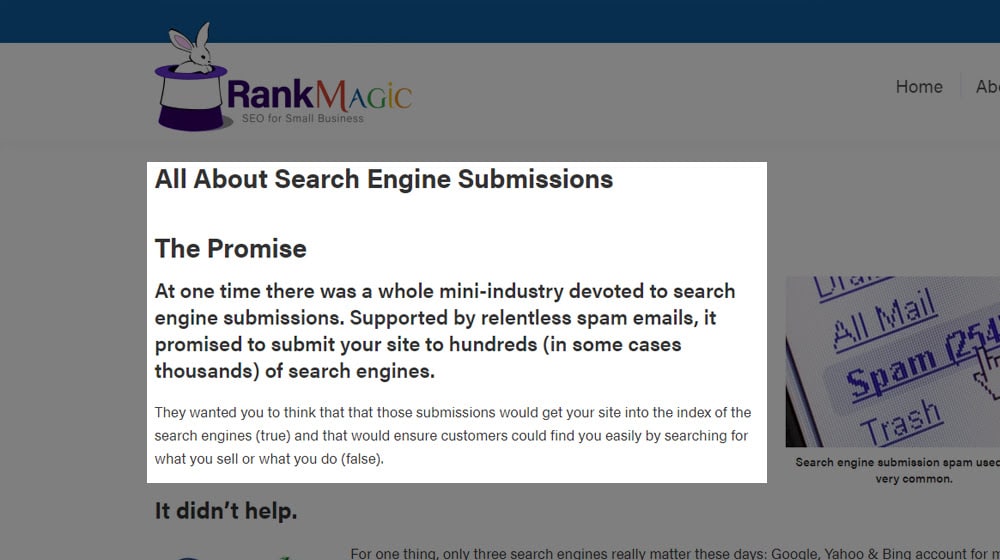
This used to be valuable back when search engines hadn't invented web crawlers yet, but we're talking about the early 2000s here. For decades, there have been a million ways for search engines to discover content without the need for direct submission. Plus, after Google and Bing, how many search engines can you even think of? How important is it for your site to be ranked on Yandex or Weibo? Just don't buy it.
Press Release Marketing
Press releases have a role – I've written about it before – but even Google outright says press releases are largely ignored by their algorithm.
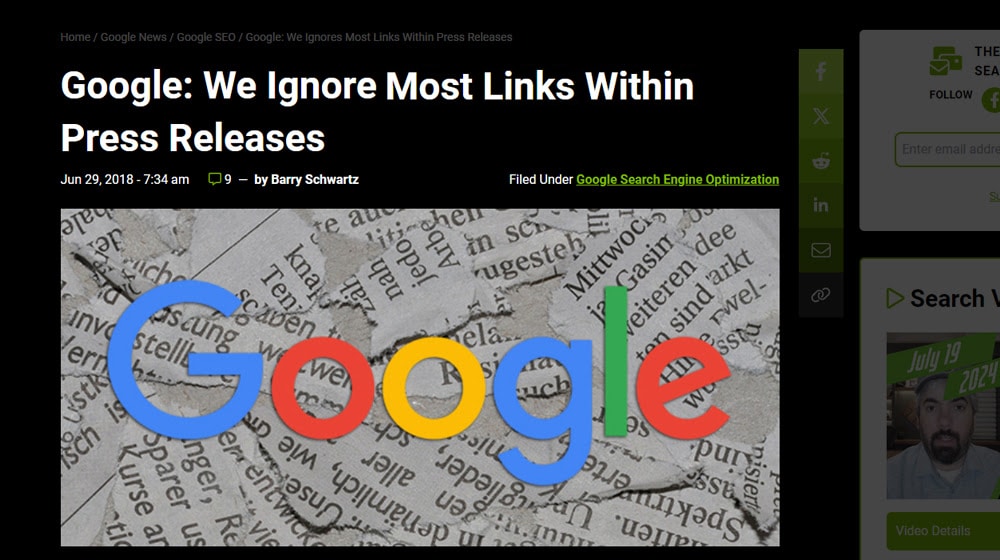
Use press releases as journalism outreach and for awareness, but don't expect them to do anything for your search ranking. Any company that offers a press release distribution service and claims it will boost your SEO is scamming you.
General Red Flags
Before we wrap things up, let's talk about some of the general red flags to watch for that can identify a scammy business from a legitimate one.
These red flags include:
- Being a Google "partner" or insider. Google technically has some certifications, but they're on topics like "how to use Google Analytics," so they aren't actually conferring any special powers or privileges. It's not meaningful for a marketer to promote.
- Long-term contracts. I mentioned this above, but it's worth mentioning again: the longer the contract and the more they pressure you into it, the scammer it is.
- Promises of guaranteed results or timelines. SEO is very wobbly and impossible to pin down. Any marketing company that guarantees any specific results or any timeline for action is lying. They can guarantee things like the amount of content they deliver or how soon they'll complete an SEO audit, but they can't guarantee a ranking, a particular amount of traffic, or anything else without exploitation.
- Too good to be true pricing. Marketing costs money. If you are being offered services at a price that seems too good to be true, it probably is.
- Lack of transparency and proprietary methods. There's no secret sauce, no hidden secrets to marketing. You can do it all yourself and learn entirely through free resources. If a marketing company is hiding its methods, it's because they know they aren't legit.
As long as you watch for these, you can eliminate most possible scams. There's always the chance something can slip through, but some awareness goes a long way.










Comments